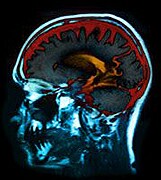
MONDAY, July 4 (HealthDay News) Contrary to current thinking, environmental factors may play a larger role than shared genes in the development of autism, a new study in twins suggests.
A second study in the same journal finds that anti-depressants during pregnancy may be one important environmental trigger.
In the first study, researchers from Stanford University identified 192 pairs of twins from a statewide California registry of children who receive services for developmental disabilities. At least one twin was diagnosed with an autism spectrum disorder, which researchers confirmed by examining and testing each child.
The study included 54 pairs of identical twins (meaning they share all of the same genes) and 138 pairs of fraternal twins (who share half of their genes).
About 42.5 percent of the male-male pairs and 43 percent of the female-female pairs of identical twins both had autism. About 12.9 percent of the male-male fraternal twins and 20 percent of the female-female fraternal twins both had autism, researchers said.
It’s not surprising that the identical twins were more likely to each have autism, since they share all the same genes, explained lead study author Dr. Joachim Hallmayer, an associate professor of psychiatry and behavioral science at Stanford University. Research has suggested that genetics play a role in the development of autism.
Nevertheless, if a disorder was 100 percent due to genetics, both siblings in each pair of identical twins would have it, which is not the case with autism.
That means the shared environment — and this could be in utero or in early life — has to play a major role, the researchers explained.
According to their calculations, this means that genes account for 37 percent of the risk of “classic,” or severe autism and 38 percent of the risk of milder autism spectrum disorders. By the same calculations, environmental factors would explain 55 percent of the risk of autism and 58 percent of the risk for an autism spectrum disorder, the Stanford team concluded.
“I was very surprised. The environmental influence is stronger than I thought,” Hallmayer said. “It doesn’t mean that genes don’t play a role, but they may not play as big a role as thought.”
Earlier small studies on twins had suggested that genetics accounts for about 90 percent of the autism risk. Researchers pointed out, however, that unlike the Stanford study, those studies did not include standard clinical assessments for autism diagnoses.
The Stanford study is published in the July 4 online issue of Archives of General Psychiatry.
The research is interesting and a good reminder that it’s important for researchers to search for environmental triggers of autism, said Dr. Gary Goldstein, president and CEO of the Kennedy Krieger Institute in Baltimore.
However, a close look at the statistics shows they might not be as powerful as it seems, Goldstein said. The statistics have a wide “confidence interval,” or range of uncertainty. For the genetic influence on autism, for example, the confidence interval was 9 percent to 81 percent — meaning there’s a chance that the actual number could fall anywhere in that range, he said.
“I think everyone in the field believes that genetics are important to autism and that the environment must also be involved. But we don’t know exactly what those environmental factors are, and how those factors interact with the genes,” Goldstein said. “This study gives further support that we should be looking at both genes and the environment.”
“Environmental” influences mean anything that isn’t in the genetic code. Research has suggested that a host of possible factors, including advanced maternal or paternal age, assisted reproductive technology and artificial insemination, maternal infections during pregnancy, giving birth to multiples, prematurity and low birth weight and complications during birth, could be among the environmental factors.
One widely-publicized, and now discredited claim, was that the MMR vaccine was a trigger, but the research was found to be fraudulent. “This study should not lead to a revisit of the vaccine issue,” Goldstein said.
Another possible environmental factor is the use of certain medications during pregnancy, including antidepressants.
In another study also published in the online issue of the journal, researchers found a two-fold risk of autism spectrum disorder among children whose mothers took antidepressants known as selective serotonin reuptake inhibitors (SSRI) during pregnancy, and that the risk was more than three times higher if the mothers took the drugs during early pregnancy, compared to children without the disorder.
SSRIs include widely used antidepressants such as Celexa, Paxil, Prozac and Zoloft.
However, the researchers, from Kaiser Permanente Medical Care Program in Northern California, cautioned that the number of children in the study who were exposed prenatally to SSRIs was low. They say that further studies are needed to validate the results.
About 6.7 percent of women who had a child with autism reported taking anti-depressants during pregnancy, compared to 3.3 percent of controls, or women who did not have a child with autism, researchers said.
Though the risks and benefits taking any medication during pregnancy should be carefully considered, Dr. Natalie Meirowitz, chief of the division of maternal fetal medicine at Long Island Jewish Medical Center in New Hyde Park, advised expectant mothers who suffer from depression not to toss their medications.
That’s because depression itself poses a risk to mother and baby. Depressed women may self-medicate with drugs and alcohol, fail to eat right and keep their prenatal appointments, and be unable to care for their baby after delivery, Meirowitz said.
“Pregnancy is a very emotional time for women, and we know that a woman who stops her medication needs a lot of support,” she said. “The decision to stop medications has to be made very carefully with the patients’ psychiatrist, obstetrician and with their significant other. It shouldn’t be made lightly.”
More information
The U.S. National Institute of Mental Health has more on autism.

